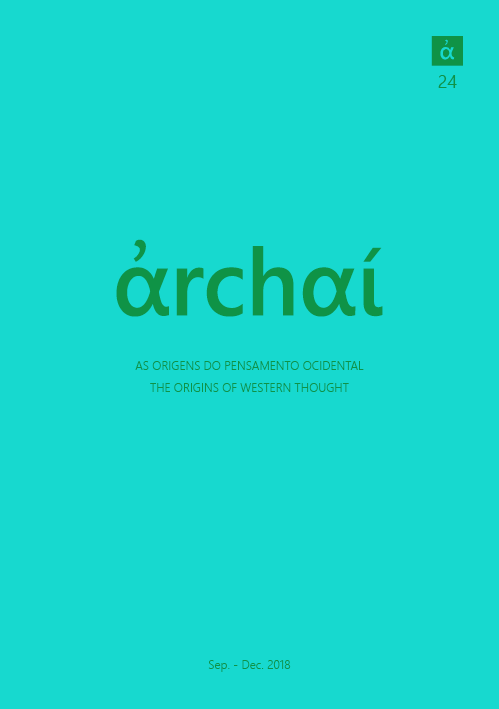ὙπόκÏισις. From the art of performing to the art of deceiving
DOI:
https://doi.org/10.14195/1984-249X_24_3Keywords:
hypocrisy, deceit, irony, metisAbstract
This article aims to investigate the assumptions that lead to a conviction by moral philosophy of the various practices of deceit commonly involved under the name of hypocrisy. The argument is developed around three questions: first, on the assumptions under which the various practices and strategies of deceit ”“ such as: simulation, dissimulation and irony ”“ become a problem to moral philosophy. Secondly, in order to understand how the hypocrisy, originally assigned to the art of the actor, comes to be part of the moral sphere designating, as art of deception, the set of those morally reprehensible strategies. Finally, how could be set a way opposed to this conviction. As I argue, that would happen with a double presumption: a distinction of perspectives between deceiving and being deceived ”“ with their respective modes of evaluation ”“ and through a re-evaluation of thought forms linked to astute intelligence that the Greeks called metis. Under these assumptions, hypocrisy could be linked to the ethical-poietical agenda of the creation of self.
Downloads
References
BERNARDAKIS, G. N. (ed.) (1888). Plutarch. Moralia (vol. 1). Quomodo adulator ab amico internoscatur. Leipzig, Teubner.
BROCKETT, O. G.; HILDY, F. J. (2002). History of the theatre. 9ed. Boston, Allyn & Bacon.
LA BRUYÈRE, J. de. (trad.) (2006). Théophraste. “Les caractères de Théophraste”. In: Libro Veritas (domaine public), p.16-56. Disponível em: <URL = http://www.inlibroveritas.net/oeuvres/4900/les-caracteres>. Acesso em: 19 dezembro, 2016.
BURNET, J. (ed.) (1903). Plato. Republic. Oxford, Oxford University Press.
BURNET, J. (ed.) (1903). Plato. Ion. Oxford, Oxford University Press.
BYWATER, J. (ed.) (1894). Aristotle. Ethica Nicomachea. Disponível em: < URL = http://data.perseus.org/texts/urn:cts:greekLit:tlg0086.tlg010.perseus-grc1>. Acesso em: 16 dezembro, 2016.
CASAUBON, I. (1763). “Liber commentarivs ”“ Praefatio”. In: FISCHER, J. F. (ed.). Theophrastus. Theophrasti characteres. Coburg. I.C. Findeisii, p. 1-240 (pdf: 383-674). Disponível em: <URL = http://books.google.com.br/books?id=R80zAQAAMAAJ&hl=pt-BR>. Acesso em: 19 dezembro, 2016.
CASAUBON, Isaac. (trad.) (1690). Theophrasti. Êthikoi kharaktêres. Friderici Arnst. (edição greco-latina) Original de: Biblioteca Estadual da Baviera (Bibliotheca Regia Monacensis). Disponível em: <URL = http://books.google.com.br/books?id=yqg-AAAAcAAJ&printsec=frontcover&hl=pt-BR&source=gbs_ge_summary_r&cad=0#v=onepage&q&f=false>. Acesso em: 19 dezembro, 2016.
CHANTRAÎNE, P. (1999). Dictionnaire étymologique de la langue Grecque. Paris, Klincksieck.
CORVISIERI, E. (trad.) (2004). Platão. A república. São Paulo, Nova Cultural.
DETIENNE, M. (1988). Os mestres da verdade na Grécia arcaica. Trad. A. Daher. Rio de Janeiro, Jorge Zahar.
DETIENNE, M.; VERNANT, J.-P. (2008). Métis: as astúcias da inteligência. Trad. F. Hirata. São Paulo, Odysseus.
DIAS, P. B. (trad.) (2010). Plutarco. Obras morais. Coimbra, Centro de Estudos Clássicos e Humanísticos.
DIDEROT, D. (1979). Paradoxo sobre o comediante. Trad. M. de S. Chauí; J. Guinsburg. 2ed. São Paulo, Abril Cultural.
DIDOT, A. F. (ed.) (1848). Aristoteles. Opera omnia (vols. I e II). Paris, Institute Francle Typographo. Originais: Biblioteca da Universidade de Michigan. Disponíveis em: <URL = http://data.perseus.org/texts/urn:cts:greekLit:tlg0086.tlg010>. Acesso em: 19 dezembro, 2016.
DIELS, H. (ed.) (1909). Theophrastus. Characters. Oxford, Oxford University Press. Disponível em: <URL = http://www.perseus.tufts.edu/hopper/text?doc=urn:cts:greekLit:tlg0093.tlg009.perseus-grc1:0>. Acesso em: 16 dezembro, 2016.
FISCHER, J. F. (ed.) (1763). Theophrasti. Theophrasti characteres. Coburg, I. C. Findeisii, Original de: Stanford University Library. Disponível em: <URL = http://books.google.com.br/books?id=R80zAQAAMAAJ&hl=pt-BR>. Acesso em: 19 dezembro, 2016.
FONSECA, I. B. da (trad.) (1998). Plutarco. Como tirar proveito de seus inimigos; Da maneira de distinguir o bajulador do amigo. São Paulo, Martins Fontes.
GONZALEZ, J. M. (2010), “Hypokritês”, CHS - Center for Hellenic Studies Research Bulletin. Disponível em: <URL = http://www.chs-fellows.org/2010/12/13/hypokrites/>. Acesso em: 19 dezembro, 2016.
KASSEL, R. (ed.) (1966). Aristotle. Ars Poetica. Oxford, Clarendon Press. Disponível em: <URL = http://data.perseus.org/texts/urn:cts:greekLit:tlg0086.tlg034.perseus-grc1>. Acesso em: 16 dezembro, 2016.
MALTA, A. (trad.) (2007). Platão. Sobre a inspiração poética (Íon) e sobre a mentira (Hípias menor). Porto Alegre, L&PM Pocket.
NIETZSCHE, F. W. (2004). Aurora. Trad. P. C. de Souza. São Paulo, Companhia das Letras.
RIBEIRO Jr., W. A. (2011). Enganos, enganadores e enganados no mito e na tragédia de Eurípedes. 508p. Tese (Doutorado em Letras Clássicas) ”“ Universidade de São Paulo, São Paulo.
SCHÜLER, D. (trad.) (2007). Homero. Odisséia (vol. 1). Porto Alegre, L&PM.
SOUZA, E. de (trad.) (1973). Aristóteles. Poética. São Paulo, Abril Cultural.
SZABADOS, B.; SOIFER, E. (2004). Hypocrisy. Ethical investigations. Toronto, Broadview.
VALLANDRO, L.; BORNHEIM, G. (trads.) (1973). Aristóteles. Ética a Nicômaco. São Paulo, Abril Cultural.
VIEIRA, T. (trad.) (2008). Sófocles. Filoctetes. São Paulo, Odysseus.
Downloads
Published
How to Cite
Issue
Section
License
Given the public access policy of the journal, the use of the published texts is free, with the obligation of recognizing the original authorship and the first publication in this journal. The authors of the published contributions are entirely and exclusively responsible for their contents.
1. The authors authorize the publication of the article in this journal.
2. The authors guarantee that the contribution is original, and take full responsibility for its content in case of impugnation by third parties.
3. The authors guarantee that the contribution is not under evaluation in another journal.
4. The authors keep the copyright and convey to the journal the right of first publication, the work being licensed under a Creative Commons Attribution License-BY.
5. The authors are allowed and stimulated to publicize and distribute their work on-line after the publication in the journal.
6. The authors of the approved works authorize the journal to distribute their content, after publication, for reproduction in content indexes, virtual libraries and similars.
7. The editors reserve the right to make adjustments to the text and to adequate the article to the editorial rules of the journal.



